
The Brachyceran infraorder Xylophagomorpha is a small group that consists solely of the family Xylophagidae, which presently contains subfamilies that were sometimes considered to be two small related families. Other obsolete names for members of this family include Exeretonevridae and Heterostomidae.
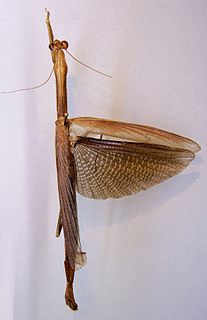
Danuria is a genus of African praying mantids in the family Deroplatyidae.
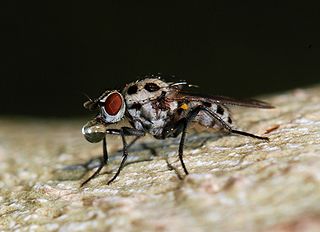
Anthomyia is a genus of flies in the family Anthomyiidae. They look rather like small houseflies, but commonly have conspicuous black-and-white patterning. This appears to be a mild form of aposematic coloration, though they do not appear to be distasteful unless they have eaten something offensive to the predator and have loaded their guts with it.
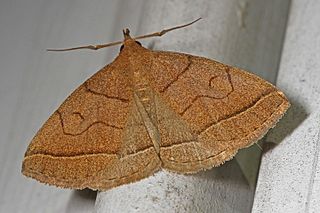
Zanclognatha obscuripennis, the dark zanclognatha, is a litter moth of the family Erebidae. It was described by Augustus Radcliffe Grote in 1872. It is found in North America from Missouri to Quebec, south to Florida and Texas.
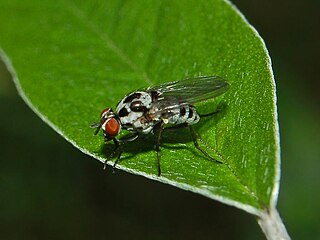
Anthomyia quinquemaculata is a species of anthomyiid fly belonging to the family Anthomyiidae.
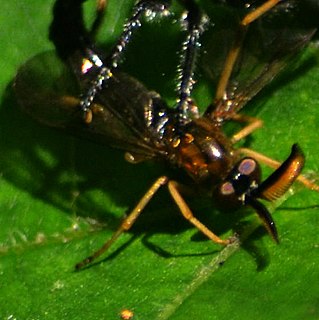
Rachicerus obscuripennis is a North American Diptera of the Rachicerinae family. It is the only North American species with pectinate (comblike) flagellomeres. It was first described by Hermann Loew in 1863.

Rachicerus is a small genus of flies belonging to the subfamily Rachicerinae.
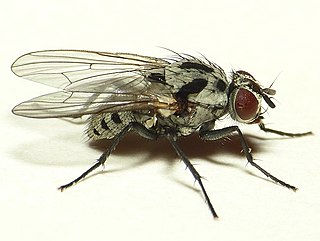
Anthomyia procellaris is a species of fly in the family Anthomyiidae.
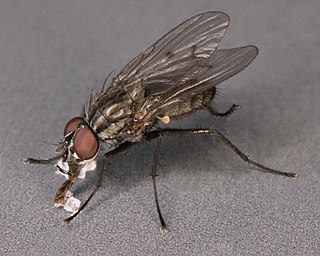
Anthomyia confusanea is a species of fly in the family Anthomyiidae. It is found in the Palearctic.
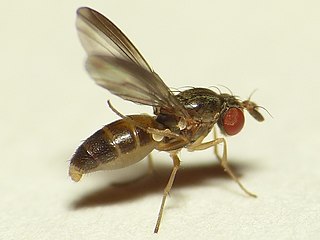
Campichoeta obscuripennis is a species of fly in the family Campichoetidae. It is found in the Palearctic.
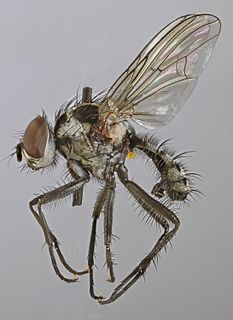
Anthomyia bazini is a species of fly in the family Anthomyiidae. It is found in the Palearctic. For identification see:
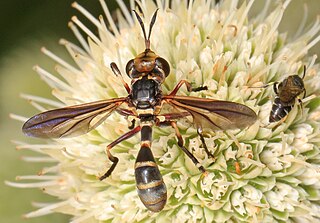
Physoconops is a genus of thick-headed flies in the family Conopidae. There are about 13 described species in Physoconops.
Physoconops obscuripennis is a species of thick-headed fly in the family Conopidae.

Anthomyia oculifera is a species of root-maggot fly in the family Anthomyiidae.
Anthomyia ochripes is a species of root-maggot fly in the family Anthomyiidae.
Anthomyia mimetica is a species of root-maggot fly in the family Anthomyiidae. It is found in Europe.
Andrena obscuripennis, the dark-winged miner, is a species of mining bee in the family Andrenidae. It is found in North America.
Pterotus obscuripennis is a species of firefly in the beetle family Lampyridae. It is found in North America. Adult males are smaller, alate, capable of fight, have an elaborate antenna morphology, and are totally non-luminous. Adult females are larger, fully larviform and flightless, and cream to light golden brown in color, and luminous with photo organs on the seventh and eighth abdominal segment. Larvae are largely black in color, with cream to white coloration in the spaces between the body segements, and are luminous and predatory on slugs.
Anthomyia cannabina is a species of fly in the family Anthomyiidae. It is found in the Palearctic. Identification of Anthomyia cannabina is described in Bei-Bienko & Steyskal 1988.

Anthomyia pluvialis is a species of fly in the family Anthomyiidae. It is found in the Palearctic.











